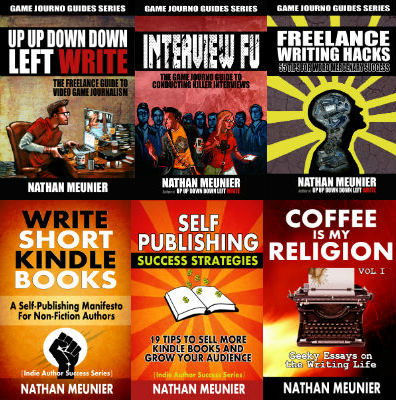Case Study: Nathan Meunier Profits With Low Budget Kindle Publishing

How to De-Hype Your Content

6 Ways You Can Re-Purpose Your Content
Nathan Meunier is a freelance writer in the video games and tech world who loves his job, but he realizes that a passive income is something to be desired and publishes e-books as a way to advance toward a healthy retirement.
“I don’t blame people for taking the traditional route to publishing if that’s what they want to do, but I’ve always been a DIY kind of person and that’s been the foundation of my freelance writing career,” he said. “So I try to encourage others to do the same thing.”
By self-publishing, Meunier can maintain creative control over the process and earn a higher royalty for each book he sells.
A Successful Author Sets Aggressive Goals and High Standards
 So far, Nathan Meunier has published six books, all of them in digital format. His first book, “Up Up Down Down Left WRITE: The Freelance Guide to Video Game Journalism (Game Journo Guides Series Book 1)” was published in January 2014. He raised $8,000 on Kickstarter to publish the book and put it out in a Kindle edition as well as a paperback.
So far, Nathan Meunier has published six books, all of them in digital format. His first book, “Up Up Down Down Left WRITE: The Freelance Guide to Video Game Journalism (Game Journo Guides Series Book 1)” was published in January 2014. He raised $8,000 on Kickstarter to publish the book and put it out in a Kindle edition as well as a paperback.
“That showed me I could actually write a book,” he said.
Since then he’s developed a passion for self-publishing and is building his author platform on three pillars:
- Pay the bills now
- Develop projects for future income
- Explore writing and publishing as a creative outlet
“It takes time to build a platform,” he said. “You have to be patient.”
With those pillars in mind, he has set a goal to publish six books a year, but Meunier’s books aren’t huge tomes. He likes to keep them small and packed full of useful, actionable information for his target audience—other writers and journalists looking to build a career writing online.
Nathan Meunier’s Publishing Process
If you have the ability to do your own covers, it can save you on production
His writing is usually done in Word, though he has experimented with Scrivener. He often finds himself moving between devices, so Word works best for his style.
In terms of publishing, he does all of his own covers, graphics, and promotions.
“If you have the ability to do your own covers, it can save you on production,” he said, but he encourages other writers to outsource their cover designs unless they are graphic artists. “I have a design background, so I feel comfortable tinkering with Photoshop.”
Meunier also spends a lot of time self-editing, but he does rely a lot on beta readers and fellow writers with whom he exchanges editing services.
“I’ve hired editors in the past, but for the last couple of books I haven’t,” he said. “It’s really easy to fix mistakes when you find them.”
By keeping his books to 10,000 to 20,000 words each, he makes the editing process simpler and more easily manageable. Plus, he maintains a couple of lists, one for beta readers that is a couple of hundred strong, a list he built up over time. The other is for advance readers, and he likes to rotate that list from book to book, focusing on a handful of readers out of 15 or 20 interested in the topics he writes about.
Why Beta Readers Are Important
Most Successful Book to Date
|
For Meunier, beta readers are the key to his success. He sends them advance reading copies so they can read his books before launch. Then he schedules a “soft launch” date late in the week in preparation for the public launch, which usually falls on a Sunday or Monday.
“Those seem to be good book selling days, for some reason,” he said.
He always buys the first book himself so he can make sure it looks the way it’s supposed to look. Then he makes any necessary changes. After that, he sets the book to free for no more than two or three days.
“While it’s free, I don’t do any heavy promotion publicly,” he said. “I send an e-mail to my beta readers asking them to download a copy of the book and leave a review.”
By that time, most beta readers have already read the book, but it’s important for them to download a copy from Amazon because when they leave their review Amazon will show that they have a verified purchase of the book, which adds credibility to the review. After three or four days, Meunier will start getting other reviews. When he gets 10 reviews on a book Amazon will start promoting it to readers of similar books.
Just before his free promotion ends he will send out a final notice to his e-mail list to let them know the book will soon no longer be free. He usually ends up seeing over 1,000 free downloads of each book before they start selling.
“Even if only one-third of those people like it and review it, it will start selling,” he said.
Meunier then raises the price of his newly launched book to 99 cents and starts promoting it heavily.
“That helps,” he said. “I usually get 10 to 30 downloads per day for a week. That first week determines how the book will sell beyond that.”
Meunier then pulls out all stops. He begins to promote his book to Facebook groups, posts to Twitter a couple of times a day, writes about the book on his blog, and e-mails his friends directly to promote his book.
“I do that for a couple of weeks. I blog about how things are going and challenges I’ve run into in the publishing process. People like reading about that stuff,” he said.
When he published the second book in his current series, the Indie Author Success Series, he changed the title of the book mid-way through the launch period and blogged about that.
One thing he typically does is sign up for free and one dollar promotions so his book can get additional exposure. And he cross-promotes with other writers.
“That kind of good will can come back around,” he said.
While Meunier does list his books on his website, he links back to Amazon’s sales page rather than sell directly on his own site.
“I link to Amazon because I want reviews and traffic to boost rankings on Amazon,” he said. “I get more impact by having people download my books. However, if I had a big mailing list, I’d be more inclined to sell on my site.”
The Key to Profits Are Keeping Expenses Low
I keep expenses nonexistent if I can help it.
“I purchased indieauthorsuccess.com,” he said, “because I can promote the series by linking to that URL, but then it redirects to my series page on Amazon. That’s really cool because it shows people that I have other books that relate to that book.”
Total expenses for the entire series – $7, or the cost of an URL.
“I keep expenses nonexistent if I can help it.”
In other words, the less he spends the more he makes. It’s working too, because he’s sold 4,000 copies of Write Short Kindle Books: A Self-Publishing Manifesto for Non-Fiction Authors since January, versus 1,500 copies of his first book. However, he does manage to slip a few links into his books to upsell other products he’s created, and that translates into additional income.
As long as Amazon is the top e-book selling destination, Meunier has a good system. That prospect looks pretty good for the foreseeable future.
 Are you ready to boost your authority? Looking for ways to expand your reach and deliver the best content for your niche audience? Download my free report, “14 Types of Authority Content“. Learn the 14 types of content that will keep your audience coming back for more and instantly make you an authority they can rely on.
Are you ready to boost your authority? Looking for ways to expand your reach and deliver the best content for your niche audience? Download my free report, “14 Types of Authority Content“. Learn the 14 types of content that will keep your audience coming back for more and instantly make you an authority they can rely on.
* Trust me, I’m no fan of spam either. You can trust me with your contact information. I’ll use it only to deliver your special report, and occasionally may send out special offers or communicate with you on building authority with content. You can opt out any time.
Check out Nathan Meunier’s books on Amazon

Games Journo Guides Series
Indie Author Success Series
Coffee Is My Religion: Geeky Essays on the Writing Life (Vol. 1)


 Reader reviews, of course is only one metric. When asked why “Write Short Kindle Books: A Self-Publishing Manifesto for Non-Fiction Authors” was his best-selling book to date, Meunier said it’s hard to know for certain, but the choice of a stronger niche market seemed to make a difference.
Reader reviews, of course is only one metric. When asked why “Write Short Kindle Books: A Self-Publishing Manifesto for Non-Fiction Authors” was his best-selling book to date, Meunier said it’s hard to know for certain, but the choice of a stronger niche market seemed to make a difference.